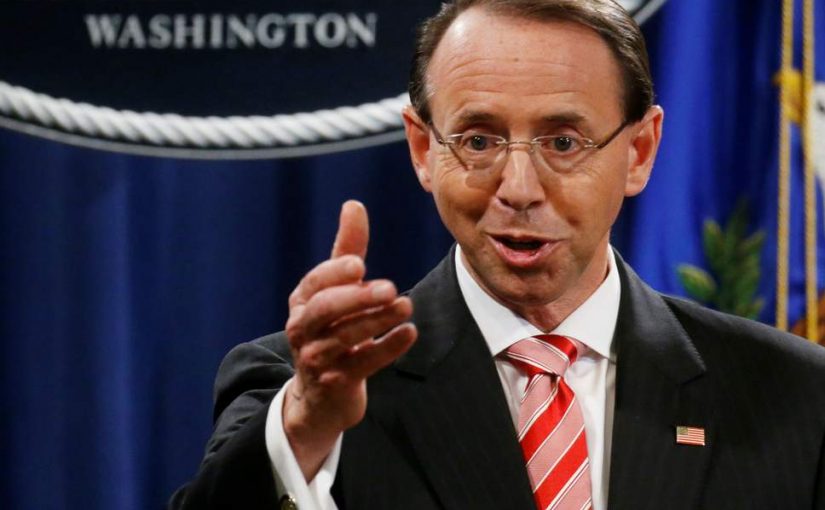India arrests 81 for ‘sympathizing’ with Pakistan
12 Russian intelligence officers indicted by US for hacking Democrats emails in 2016 election

Deputy US Attorney General Rod Rosenstein announces the grand jury indictments of 12 Russian intelligence officers ( Leah Millis/Reuters )
A dozen Russian intelligence officials have been charged with allegedly hacking and leaking emails of senior Democrats during the 2016 US presidential campaign, the Department of Justice (DoJ) has announced.
The indictments were revealed Deputy Attorney General Rod Rosenstein as part of the FBI probe, led by Special Counsel Robert Mueller, into election meddling and potential coordination between members of the Trump campaign and Russia.
The Russians are accused of hacking into the computer networks of the Democratic National Committee (DNC), the Democratic Congressional Campaign Committee (DCCC) and the presidential campaign of Hillary Clinton, and then releasing stolen emails on the internet in the months before the election.
In its indictment, the Justice Department indictment alleges the Russian officials “staged” releases of emails they had stolen from the DNC and Ms Clinton’s campaign in their apparent attempts to sway the election against the Democratic Party’s candidate.
“In or around 2016, the Russian Federation operated a military intelligence agency called the Main Intelligence Directorate of the General Staff (GRU),” the indictment reads. “The GRU had multiple units … engaged in cyber operations that involved the staged releases of documents stolen through computer intrusions. These units conducted large-scale cyber operations to interfere with the 2016 US presidential election.”
Mr Rosenstein said the Russian intelligence officials used the names “DCLeaks and Guccifer 2.0” to release the emails they had collected throughout the campaign season, as well as “another entity.”
Those two hacking entities were responsible for a large portion of the emails from the DNC and Ms Clinton’s campaign which were dumped online.
The news arrived as President Donald Trump was being received by Queen Elizabeth II at the Royal Palace, and days before the US president is set to meet with Vladimir Putin in Finland on Monday.
The charges include “conspiring to infiltrate computers,” with defendants working in Russia’s main intelligence units, according to Mr Rosenstein.
“The internet allows foreign adversaries to attack Americans in new and unexpected ways,” Mr Rosenstein said. “Free and fair elections are hard-fought and contentious and there will always be adversaries who work to exacerbate domestic differences and try to confuse, divide and conquer us.”
Before Friday’s announcement there had been at least 79 charges brought against at least 20 separate officials in the investigation into Russian meddling in the 2016 election led by Mr Robert Mueller, with five guilty pleas and one sentencing already being announced.
Mr Rosenstein also previously held an unexpected news conference in February, when he announced indictments related to 2016 presidential election interference against a Russian internet firm and 13 Russian nationals.
On Friday, Mr Rosenstein alleged the Russian officials paid for hackings using cryptocurrency, and coordinated with each other using advanced softwares that were difficult to trace.
Further indictments could soon arrive against Russian officials, as well as those in Mr Trump’s circle. Several members of his 2016 presidential campaign have already been indicted, including his former campaign chairman Paul Manafort and aide Rick Gates.
The investigation has also reached the White House, with Mr Trump’s former National Security Adviser Michael Flynn admitting to lying to FBI agents about his conversations with former Russian Ambassador to the US, Sergei Kislyak. He is reportedly now cooperating with the special counsel’s office.
July 27, 2016, Trump: “Russia, if you’re listening, I hope you’re able to find the 30,000 emails that are missing.”
Indictment: That evening, Russian operatives targeted Clinton campaign emails “for the first time.” pic.twitter.com/fanyaAxwfJ— Christopher Ingraham (@_cingraham) July 13, 2018
The indictment could prove damaging to Mr Trump’s claims that he, nor anyone on his campaign, ever coordinated with Russian officials during the election.
Russian operatives first targeted Ms Clinton’s campaign emails “on or about July 27, 2016,” according to the indictment — the same day Mr Trump said during a televised statement, “Russia, if you’re listening, I hope you’re able to find the 30,000 emails that are missing.”
That same night, the Justice Department alleges Russian officials spearphished individuals affiliated with Ms Clinton’s presidential campaign and targeted at least 76 email addresses associated with the Clinton Campaign domain.













Leave a Reply
Be the First to Comment!
You must be logged in to post a comment.
You must be logged in to post a comment.